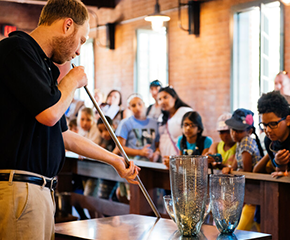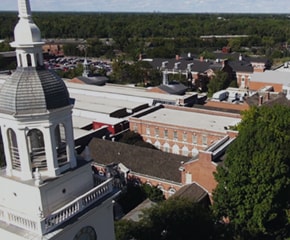Kodak No. 2 Bull's-Eye Camera, Model D, 1899-1913
Add to SetSummary
Box cameras were simple: a lens at one end, a glass plate or film at the other. Introduced in the 1880s -- and mass marketed with Kodak's Brownie in 1900 -- these cameras were accessible and affordable for amateur photographers. Improvements in film and multiple exposure capabilities caused a relaxed approach to the photography of everyday life -- the snapshot was born.
Box cameras were simple: a lens at one end, a glass plate or film at the other. Introduced in the 1880s -- and mass marketed with Kodak's Brownie in 1900 -- these cameras were accessible and affordable for amateur photographers. Improvements in film and multiple exposure capabilities caused a relaxed approach to the photography of everyday life -- the snapshot was born.
Artifact
Box camera
Date Made
1899-1913
Location
Not on exhibit to the public.
Object ID
2003.0.22.5
Credit
From the Collections of The Henry Ford.
Material
Glass (Material)
Iron alloy
Leather
Nickel (Metal)
Wood (Plant Material)
Color
Black (Color)
Dimensions
Height: 5.25 in
Width: 6 in
Length: 4.625 in
Inscriptions
camera, interior: NO. 2 BULL'S-EYE KODAK MODEL D / U.S. PATENTS: DECEMBER 1, 1891; SEPTEMBER 25, 1894; JANUARY 12, 1897; APRIL 6, 1897; APRIL 11, 1899. OTHER PATENTS APPLIED FOR. / MANUFACTURED BY THE EASTMAN KODAK CO. ROCHESTER, N.Y. / SUCCESSOR TO BOSTON CAMERA MFG. CO. / MADE IN U.S.A. / WHOLESALE AND RETAIL: . . . / AGENCIES . . . label, inside camera: IN ORDERING SUPPLIES FOR THIS CAMERA ALWAYS SPECIFY FOR NO. 2 BULL'S-EYE, MODEL D. embossed, strap: EASTMAN KODAK CO. / NO. 2B BULL'S-EYE KODAK / ROCHESTER, N.Y. U.S.A.





